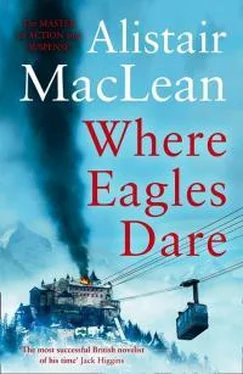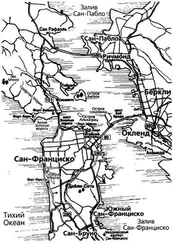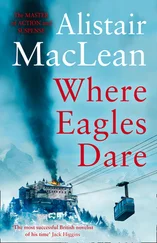‘And I have a rear mirror. How far, Heidi?’
‘Next corner.’
While Schaffer worked quickly on the fuses, Smith concentrated on getting the post-bus round the next corner as quickly as possible without leaving the road. And then they were on and round the corner and the bridge was no more than a hundred yards away.
It was not, Smith thought, a bridge he would have chosen to have crossed with a bicycle, much less a six ton bus. Had it been a bridge crossing some gently meandering stream, then, yes, possibly: but not a bridge such as this one was, a fifty-foot bridge surfaced with untied railway sleepers, spanning a ravine two hundred feet in depth and supported by trestles, very ancient wooden trestles which, from what little he could see of them from his acute angle of approach, he wouldn’t have trusted to support the tables at the vicar’s garden party.
Smith hit this elderly and decrepit edifice at forty miles per hour. A more cautious and understandable approach might have been to crawl over it at less than walking pace but Smith’s conviction that the less time he spent on each ancient sleeper the better was as instantaneous as it was complete. The heavy snow chains on each tyre bit into and dislodged each successive sleeper with a terrifying rumble, the post-bus bounced up and down as if on a giant cake-walk while the entire structure of the bridge swayed from side to side like the bridge of a destroyer at speed in a heavy cross-sea. It had been Smith’s original intention to stop in the middle of the bridge but once embarked upon the crossing he would no more have done so than dallied to pick up an edelweiss in the path of an Alpine avalanche. Ten feet from the edge of the bridge he stamped on the brakes and skidded to a sliding halt, on solid ground again, in less than twenty yards.
Schaffer already had the back door open and the two packages of plastic explosives in his hands before the bus stopped. Five seconds after hitting the road he was back on the bridge again, skipping nimbly over a dozen dislodged sleepers until he had arrived at the main supports of the central trestle. It took him less than twenty seconds to tape one package to the right-hand support, cross the bridge and tape the second package to the left-hand support. He heard the deepening roar of a rapidly approaching engine, glanced up, saw the swathe of unseen headlamp beams shining round the corner they had just passed, tore off the ignition fuse, crossed the bridge, tore off the other and raced for the bus. Smith already had the bus in gear and was moving away when Schaffer flung himself through the back doorway and was hauled inside by helping hands.
Schaffer twisted round till he was sitting on the passage-way, his legs dangling through the open doorway, just in time to see the headlamps of the pursuing car sweep into sight round the corner. It was now less than a hundred yards from the bridge, and accelerating. For a brief, almost panic-stricken, moment, Schaffer wondered wildly if he had cut the fuses short enough, he hadn’t realized the following car had been quite as close as it was: and from the tense and strained expressions on the faces of the two girls and the man beside him, expressions sensed rather than seen, he knew that exactly the same thought was in their minds.
The two loud, flat detonations, each fractionally preceded by the brilliant white flash characteristic of the plastic explosive, came within one second of each other. Baulks of timber and railway sleepers were hurled forty feet into the air, spinning lazily around in a curious kind of slow motion, many of them falling back again on to the now tottering support structure with an impact sufficient to carry away the central trestle. One moment, a bridge: the next, an empty ravine with, on the far side of it, the wildly swinging headlamp beams as the driver flung his car from side to side in a nothing-to-be-lost attempt to prevent the car from sliding over the edge of the ravine. It seemed certain that he must fail until the moment when the car, sliding broadside on along the road, struck a large rock, rolled over twice and came to a halt less than six feet from the edge of the ravine.
Schaffer shook his head in wonder, rose, closed the rear door, sat in the back seat, lit a cigarette, tossed the spent match through the smashed rear window and observed: ‘You’re a lucky lot to have me around.’
‘All this and modesty, too,’ Heidi said, admiringly.
‘A rare combination,’ Schaffer acknowledged. ‘You’ll find lots of other pleasant surprises in store for you as we grow old together. How far to this airfield now?’
‘Five miles. Perhaps eight minutes. But this is the only road in. With the bridge gone, there’s no hurry now.’
‘That’s as maybe. Schaffer is anxious to be gone. Tell me, honey, were all those beer bottles empty?’
‘The ones we threw away were.’
‘I just simply don’t deserve you,’ Schaffer said reverently.
‘We’re thinking along the same lines at last,’ Heidi said acidly.
Schaffer grinned, took two beer bottles and went forward to relieve Smith, who moved out only too willingly with the bus still in motion. Smith’s right hand, Schaffer saw, hadn’t a scrap of bandage left that wasn’t wholly saturated in blood and the face was very pale. But he made no comment.
Three minutes later they were out of the forest, running along through open farm-land, and five minutes after that, acting on Heidi’s directions, Schaffer swung the bus through a narrow gateway on the left-hand side of the road. The headlamps successively illuminated two small hangars, a narrow, cleared runway stretching into the distance and, finally, a bullet-riddled Mosquito bomber with a crumpled under-carriage.
‘Ain’t that a beautiful sight, now?’ Schaffer nodded at the damaged plane. ‘Carnaby-Jones’s transport?’
Smith nodded. ‘It began with a Mosquito and it will end – we hope – in a Mosquito. This is Oberhausen airfield. HQ of the Bavarian Mountain Rescue pilots.’
‘Three cheers for the Bavarian Mountain Rescue pilots.’ Schaffer stopped the bus facing up the length of the runway, switched off the lights and turned off the engine. They sat silently in the darkness, waiting.
Colonel Wyatt-Turner glanced through the side-screen and breathed with relief as, for the first time that night, the ground fell away sharply beneath the Mosquito. He said sarcastically: ‘Losing your nerve, Wing Commander?’
‘I lost that September 3rd, 1939,’ Carpenter said cheerfully. ‘Got to climb. Can’t expect to see any recognition signals down among the bushes there.’
‘You’re sure we’re on the right course?’
‘No question. That’s the Weissspitze there. Three minutes’ flying time.’ Carpenter paused and went on thoughtfully. ‘Looks uncommon like Guy Fawkes night up there, don’t you think.’
The Wing Commander was hardly exaggerating. In the far distance the silhouette of the Weissspitze was but dimly seen, but there was no mistaking the intensity of the great fire blazing half-way up the mountain-side. Occasionally, great gouts of red flame and what looked like gigantic fireworks could be seen soaring high above the main body of the fire.
‘Explosives or boxes of ammunition going up, I’d say,’ Carpenter said pensively. ‘That’s the Schloss Adler, of course. Were any of your boys carrying matches?’
‘They must have been.’ Wyatt-Turner stared impassively at the distant blaze. ‘It’s quite a sight.’
‘It’s all of that,’ Carpenter agreed. He touched Wyatt-Turner’s arm and pointed forwards and down. ‘But there’s a sight that’s finer far, the most beautiful sight I’ve ever seen.’
Wyatt-Turner followed the pointing finger. Less than two miles away, about five hundred feet below, a pair of headlamps were flashing regularly on and off, once every two seconds. With a conscious effort of will he looked away and glanced briefly at Carpenter, but almost at once was back on the flashing headlamps. He stared at them hypnotically and shook his head in slow and total disbelief.
Читать дальше
Конец ознакомительного отрывка
Купить книгу










